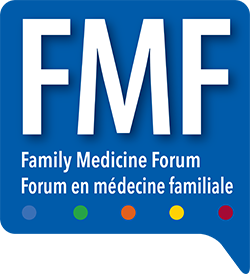DFCM Faculty at Family Medicine Forum

Family Medicine Forum (FMF) is Canada’s largest and most comprehensive annual conference for family physicians. It is hosted by the College of Family Physicians of Canada (CFPC).
This year, over 90 workshops and posters were presented by DFCM faculty, residents and staff. Below are just a sampling of the workshops presented. For a full list of faculty, resident and student presentations and posters at the 2016 FMF Conference:
Download the PDF >
|
Keynote Address:
|
Choosing Wisely Canada and Family Medicine: Measuring overuse and progress in implementation Session participants will learn about the extent of unnecessary tests for three CWC recommendations relevant to the practice of family medicine. These recommendations include: don’t conduct imaging for lower-back pain in the absence of red flags; don’t screen women with Pap smears if they are < 21 or > 69 years of age; don’t repeat DEXA scans more often than every 2 years. |
KidneyWise: A primary care clinical tool kit for the detection and management of chronic kidney disease Chronic kidney disease (CKD) affects approximately 2 million Canadians and is a recognized risk factor for all-cause mortality. By the end of this session, participants will be able to: 1) identify which patients are at higher risk for CKD; 2) understand which investigations to order and how to interpret the results; 3) manage CKD and its associated cardiovascular comorbidities; and 4) appropriately select which patients need to be referred for nephrology consultation. |
||
|
Creating Value for Family Physicians: How to participate in and benefit from research to transform care We need to generate evidence in primary care; this evidence should reflect our patients and our practices. Generating practice-based evidence requires that research happen in family practices so that the results are applicable to patients like those we see on a daily basis. However, family physicians are busy and adding another activity, like participating in research, is difficult.
|
Practice-Based Research for Beginners: Research redefined, simplified, and demystified Objectives: To dispel the misperceptions about the role of research in primary care practice and enthuse participants to pursue research/academic enquiry relevant to their practices.
|
Menopause: Case-based management After a review of the approach to the assessment of the menopausal patient, a variety of cases will be discussed to highlight the evidencebased guidelines for management. When to treat, how to treat, and treatment options will be discussed, using a simple algorithmic approach. Building on basic management principles, patient follow-up and the management of adverse events and treatment failure will also be explored.
|
||
|
Scholar Role in Family Medicine: Thinking beyond research for opportunities to disseminate important work
|
Managing Low Back Pain with the 2016 CORE Back Tool: A case-based approach Participants will be walked through the tool improvements and provided with strategies that will facilitate implementation into family medicine practice patterns. Three cases will be presented to illustrate the tool’s application to patients with acute, persistent, and chronic low back pain. The audience will have an opportunity to see a role play of the patient interaction using the tool and discuss options for management in all cases.
|
Your Besrour Centre: Where are we now? Participants will learn about the activities and working groups of the Besrour Centre and will share ideas around how to further advance family medicine around the globe. The presentation will include a presentation by Besrour partners and small group discussions.
|
||
|
Informing a New Curriculum: A generalist lens Melissa Nutik*, MD, CCFP, FCFP, MEd, Toronto, ON; Azadeh Moaveni, MD, CCFP, Toronto, ON; Ruby Alvi, MD, CCFP, MHSc, Toronto, ON; James Owen, MD, CCFP, Toronto, ON; Risa Freeman, MD, MEd, CCFP, FCFP, Toronto, ON
|
Intrapartum Skills: A refresher of specific skills. This interactive session will provide participants with an opportunity to develop further skills in intrapartum care. In small groups, participants will have the opportunity to review and practise crucial intrapartum skills such as vacuum-assisted birth, release of shoulder dystocia, and somersault manoeuvre for tight cords. Additional skills of placement of Foley catheter for induction and management of postpartum |
Prospective Validation of an iOS App to Evaluate Tremor in Patients With Alcohol Withdrawal Syndrome. Ideal management of alcohol withdrawal syndrome incorporates a symptom-driven approach, whereby patients are regularly assessed using a standardized scoring system (Clinical Institute Withdrawal Assessment for Alcohol-Revised; CIWA-Ar) and treated according to severity. Among the domains assessed by the CIWA-Ar, tremor is the most objective indicator of withdrawal severity. However, the ability of clinicians to reliably quantify tremor is highly dependent on experience.
|
News



